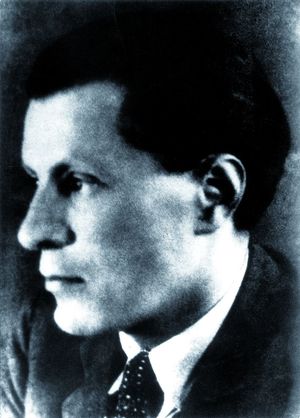Born on 31 December, 1905 in Siekierzyńce, Volhynia, died on 19 May 1970 in Warsaw. In 1926 Tadeusz joined the Benedictine Order in St. André-lez-Bruges in Belgium, but after a year and a half he was removed from it. After he returned to Poland, he began to study philosophy at the University of Warsaw. Simultaneously between 1928 and 1932, he worked in the diplomatic service, including as an attaché of the Polish embassy in London, where he graduated, receiving a degree in philosophy. Unsatisfied with a career in diplomacy, in 1933 he decided to devote his life to literature.
Between 1933 and 1937 he was Editor of the culture section in Kurier Poranny*, before the war he was also associated with Tadeusz Boy-Żeleński’s* Młody Teatr.
From the start, Breza was enthusiastic about Schulz’s writing. In April 1934 he wrote and published in Kurier Poranny one of the first reviews of The Cinnamon Shops*, which he considered to be “an extraordinarily beautiful book, a record of embodied poetry, not to bebroken in our country for a long time”. This article began Schulz’s correspondence with Breza and shortly afterwards – between 1934 and 1935 – they met in Warsaw*. In Breza’s memoirs there is a description of a peculiar impression which Schulz made on him: “Just like his letters, he was small and charming. He seemed not to be a human but an homunculus […]. This miniature man had a tiny body. Only his head was big. Big eyes. The accent slightly echoing that of Lviv or Lesser Poland. His manner was hard to define. Light moves. […] He flitted among people with agility, all of whom werebiggerin size”.
In the following years Breza often published texts on Schulzby authors such as Andrzej Pleśniewicz or Witold Gombrowicz. In turn Schulz published a glowing review in Tygodnik Ilustrowany* of Adam Grywałd, Breza’s debut novel from 1936.
Schulz’s letters to Breza and his fiancée (and later wife) Zofia Nyczówna* were written between 1934 and 1938. Always in a friendly tone – at times essaystic or literary – they prove that the two correspondents were close friends. Unfortunately Schulz’s first letter became lost in the war, just like all the replies by Tadeusz and Zofia Breza.
After the war Tadeusz Breza was part of cultural and political life of the Polish People’s Republic. As the author of Mury Jerycha (1946), Uczta Baltazara (1952) and Urząd (1960), he gained communists’ approval. He returned to work in diplomacy, including posts in Rome and Paris. (jo), (transl. ms)


